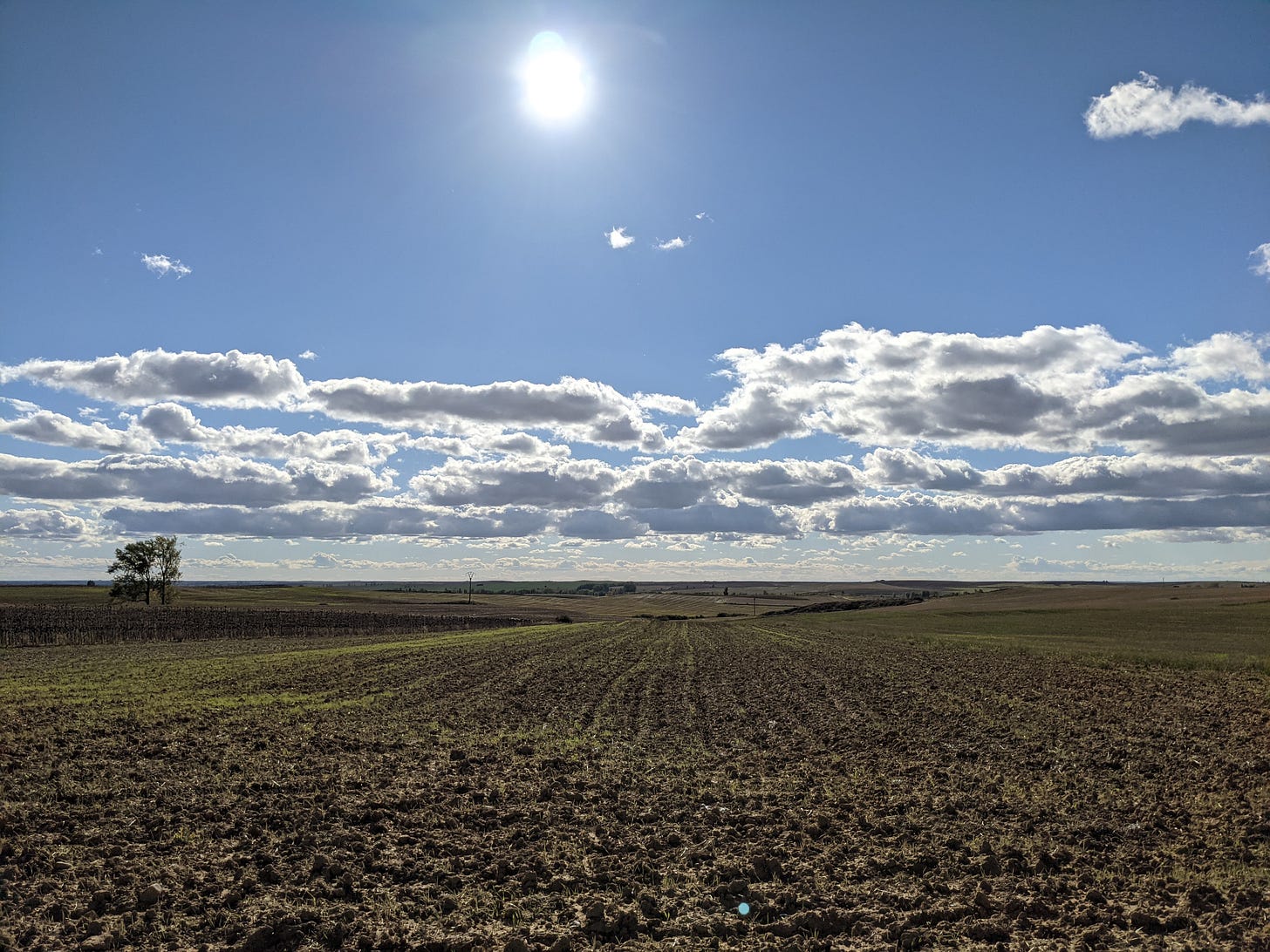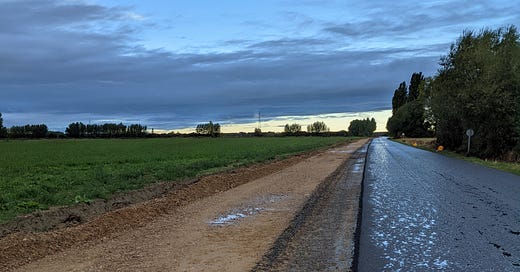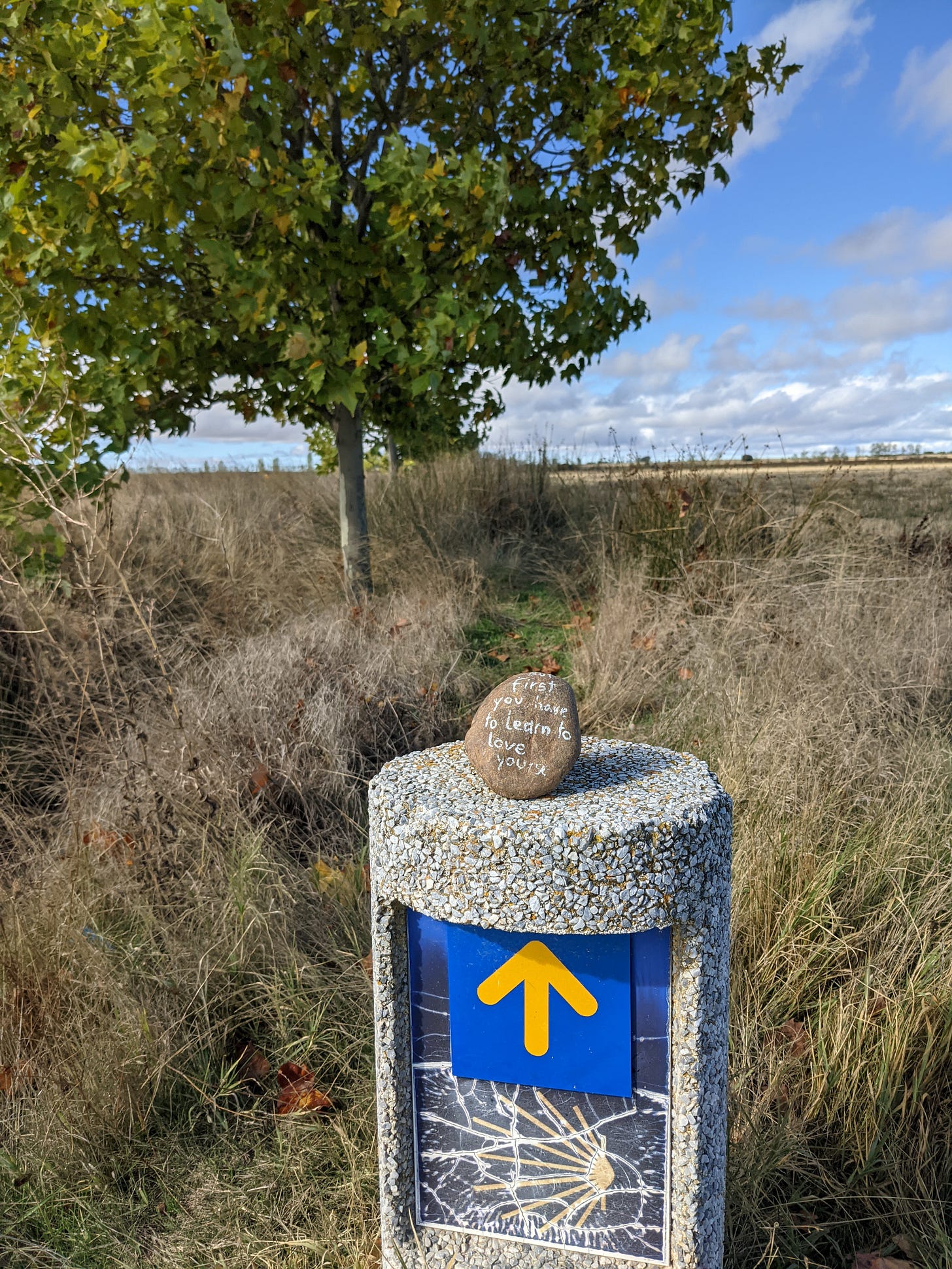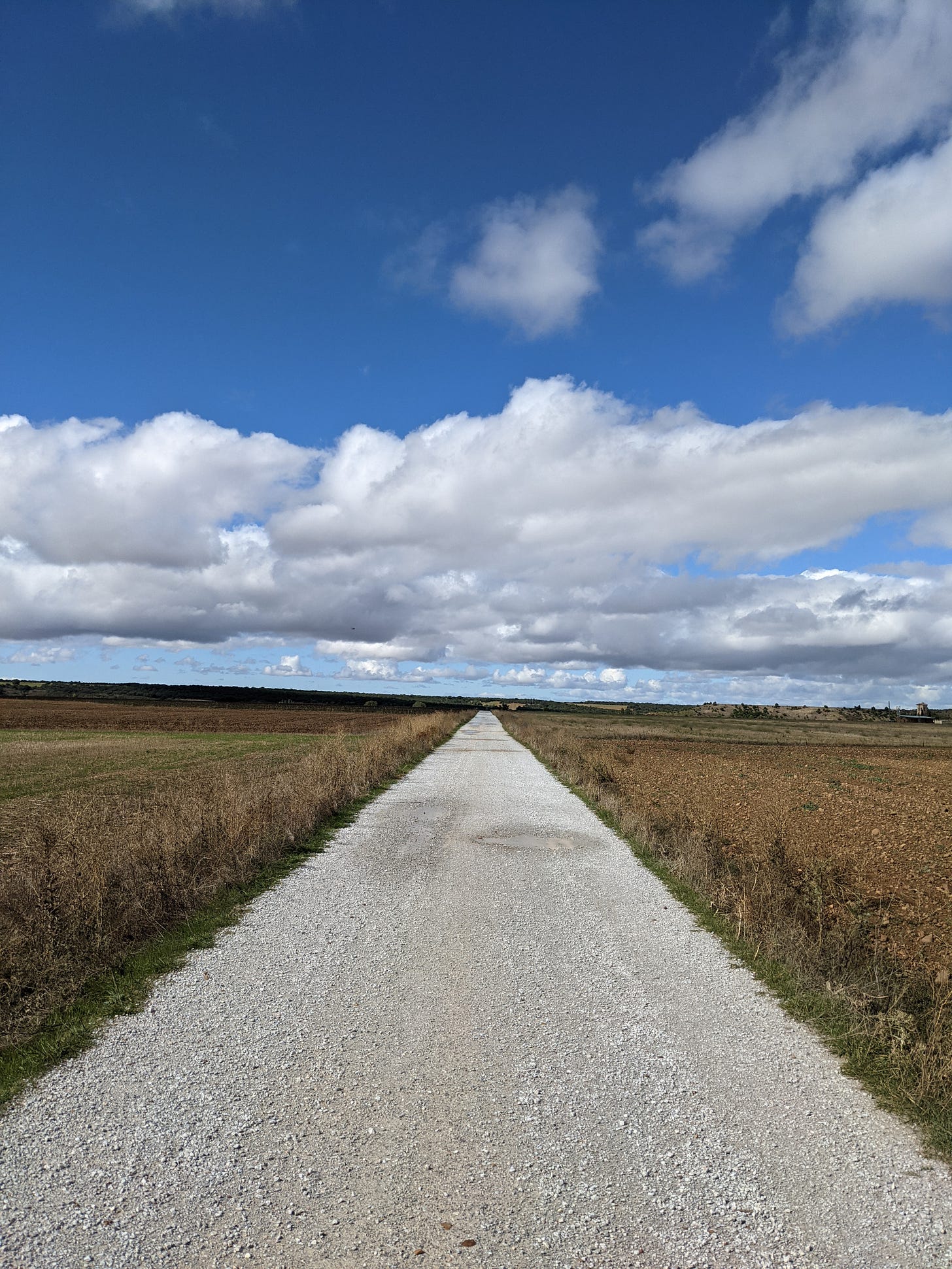Camino de Santiago Day 17: Carrion de los Condes to Terradillos de los Templarios
I'm approaching the halfway point of the Camino, and starting to understand what the mental third of the journey is
If you would like to follow me on my journey on the Camino de Santiago, then sign up now for regular updates.
The road out of Carrion is straight and flat. There’s no town for the next 18 kilometres. Sometimes there’s some shade from a hedgerow, though it’s mostly flat. There’s also very little in the way of external stimulation. The rain dries off as I walk, and when the sun comes out it’s hot. About 10km I stop at a mobile coffee truck. I bump into several friends, one by one. Or rather, I lure them into stopping and taking a seat with me. Marco tells me he works as a hairdresser at home in Italy, and wants to start his own business. Jose Manuel tells me about the Spanish armada, and how the Spanish thought the Irish would welcome them because they’re also Catholic, but instead murdered them. He’s fascinated by this. Sergio tells me that although Galicia has a Celtic historic culture, the Galicians actually settled Ireland before the Celts did, 6,000 years ago or more. Federica arrives and I realise that although I’ve known her for over a week, this is the first time I’ve seen her actually walking on the Camino. Colin makes a joke about something that happened a few days ago. As I continue walking down the road, alone again after a much-longer-than-expected break, I remember his punchline, and erupt in laughter so hard that tears flow from my eyes, almost having to stop walking, laughing uncontrollably as if I’ve triggered a bout of vomiting, over and over again, unable to stop, even though I’m entirely alone.
The road has lost all meaning at this stage
We’re at the halfway point – 390km in. Another 390km to go.
Sounds enormous, and it’s only now that we’ve done nearly 400 that we can truly understand what another 400 is going to be like.
The enormity of experience that another 2 and a half weeks will provide is incredible. Each day like a whole life’s worth of experiences, you could talk about each one for a full day – where to begin, where to end, what were the real meaningful events, even if you spent it alone
It has an effect on you
If you’re open to it
And we’ve all that to go again
Plus the weight of having reached our destination, succeeded in our journey – that’ll multiply the totality of the experience by two, or two hundred!
But for now we know nothing about our destination – or what it will be like to get there. We can’t even remember the beginning, or who we were before we began. The starting line is too far in the past, we’ve come too far now.
Like Cortez – the boats have been burnt
But the finish line is still too far away – it’s too far a bridge for our minds to cross yet – we’ve no idea who we’ll be when we get there. So much still ahead of us, we may as well just be starting.
But we can’t go back, not now.
If you’re enjoying this and think others will enjoy reading about my journey on the Camino, then why not share it?
It starts to dawn on me what the mental third is. We are stranded in no-man’s land. No starting point to look back or destination in sight for us to attach to, to cling onto and pull ourselves into the new world
We are cast adrift in a spiritual abyss
No fixed abode, the road and its people keep moving without stop
Nothing to rely on or attach to but ourselves
You’d better hope that it’s built on something firm, and real
Or else you might drown, or lose yourself
Down some darkened alley or a dead end
Appropriate enough that this point is reached on the flat open dusty road, not even external stimulation for you to anchor yourself to
Just you and the road and the burning sun – and your self –
if you’re lucky
I found myself at a bit of a loose end in the evenings those days. And in the mornings I became more aware of the automatic urge to get up and go. To wake up, to pack up my things according to my now-satisfying routine. And to hit the road, often while it was still dark. To be honest, I was so conscious of having to do it that I rarely stopped to think about what I was doing. I was going because I had to. But even now, I think I’m only making an issue of it – this unconscious automated doing of the thing I came here to do – because I felt like I should.
In the evenings I’d find it hard to relax, always second-guessing whether I should remain alone or with people. Questioning the purpose of the trip, and how I wanted to walk on the road.
I was getting anxious to get to Leon. I’m not sure if it was because of the now-infamous landscape of the Meseta – which to me was beautiful in the earlier stages, though by now was becoming more of the flat, featureless expanse of industrialised agriculture that I had expected. I was actually quite enjoying the time for inner reflection afforded by the open roads and the fact that I felt quite comfortable and at home where I was. No longer was mental bandwidth being sapped trying to figure out how the Camino works, and how it works for me: the ‘how’ of how I walked the Camino was quite apparent by now. I felt relaxed, at home, free to walk and engage with the world however I wanted; after two-and-a-half weeks of walking, you’ve had enough time to sink into the trip, detach from home and your true self is allowed to rise to the surface, in as much as it exists.
To be honest, the day-to-day experience of the Camino never lessened for me in this period. I also had many memorable bonding sessions – by day and by night – with fellow pilgrims, and many friendships were made and solidified during this period. I can’t help but feel that this was not in spite of either the setting or its relative timing on the Camino, and in fact might have been because of it.
There was that gnawing anxiety to get to Leon though. Its renown as a city, its position at (or near, rather) the end of the Meseta, and the fact that people wouldn’t shut up about it made its reputation grow in my mind, even if it was all an arbitrary one.
I couldn’t help myself. I was enjoying the build-up, the physical experience of being in Spain and travelling on foot, the mental preparation of inner work and self-discovery, and the time and space afforded to meet new people, but at this stage I was ready. I couldn’t wait for the end. The real meat of the journey, the period of Revelations and of finding the gold at the end of the maze.
But the fact that we were so far from the end yet did funny things to the mind. No longer a beginner, but no longer sufficiently prepared for the moment of transcendence. Probably peak naïve idiot to be honest – you still know so little but know just enough to believe yourself to be an expert. An expert on the Camino, an expert on yourself and an expert on everything you see and everyone you meet.
The beauty of walking somewhere is you are forced to prepare yourself for the destination. You’re not just flying to the highlight. You create your own meaning in the journey to get there - the destination becomes irrelevant, and everything becomes a potential highlight, or lowlight. But the road itself isn’t always easy, and there’s the paradox that although the destination is irrelevant, it’s the things driving you onward each day. And at this point, it’s hard to understand on the deepest level what the hell you’re even doing here.
Drowning now in a void of meaning, no longer a beginner and no end in sight.
Yourself the only thing providing meaning. Be sure to take care. Don’t lose sight of your goal. Practice the simple things that get you through the day. Be aware of your actions and how you might lose yourself, but don’t be too hard on yourself when you do inevitably slip up – you will, and so will everyone else you see on the road. Everyone has their weak spot, they’ll be exposed at some point.
Everyone has their poison.

In Terradillos the wine keeps flowing. Our hosts keep sending us jugs of us. A large group has formed, the usual venn diagram of friends you know already and those you are yet to know. We push two tables together. They keep sending more wine, we keep drinking it.
I realise now what the mental third of the Camino is. It’s what they used to call the devil. It’s whatever is most appealing to you, that which you find comfort in. That which makes life more enjoyable, and gently leads you off the path you were doing so well to stay on.
For some it might be a comfortable bed, or a bus, the safety of a group. Some might never answer the call to adventure in the first place.
Everyone has their poison.
In the morning, I leave in a hurry. As I leave the dorm room I hear my deadpan goodbye - the continuation of a now long-running joke - repeated behind me in disbelief:
“Did he just say he was going to do 50km?!”
I have to keep walking.
If you’ve done the Camino, are thinking of doing it, or are just interested in discussing the Camino or travel in general - then please leave a comment. I’d love to hear from you.






